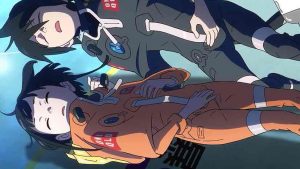 I said a lot of what I wanted to say about Chikyuugai Shounen Shoujo in my review of Episode 5, thematically at least. It’s a series (or a movie or ONA or whatever you want to call it) I could honestly write volumes about. It fascinates me not just for what it is but for how it’s being received, and its place in the modern anime landscape. It’s really an anime out of time, and not just because it’s been in development since 2014. It’s a series that looks forward using the language of the past in many ways, with a total disregard for what’s fashionable in the medium today.
I said a lot of what I wanted to say about Chikyuugai Shounen Shoujo in my review of Episode 5, thematically at least. It’s a series (or a movie or ONA or whatever you want to call it) I could honestly write volumes about. It fascinates me not just for what it is but for how it’s being received, and its place in the modern anime landscape. It’s really an anime out of time, and not just because it’s been in development since 2014. It’s a series that looks forward using the language of the past in many ways, with a total disregard for what’s fashionable in the medium today.
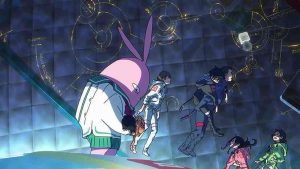 Iso Mitsuo said something quite interesting in an interview about The Orbital Children (he attributed it in part to Murakami Haruki, thought I’ve never seen it attributed to him). To wit, that fiction was a “cradle” – a place that protected him from his negativity about the world. Iso believes (and I think he’s right) that the Japanese have basically abandoned not just being hopeful about the future, but the idea that being hopeful about the future is important. As Iso put it, “Even if there are difficult problems that cannot be solved in reality, I think we can do something in the world of fiction.” When we’re helpless to right the wrongs of reality, we turn to fiction. Thus it has always been, but perhaps more so than ever now.
Iso Mitsuo said something quite interesting in an interview about The Orbital Children (he attributed it in part to Murakami Haruki, thought I’ve never seen it attributed to him). To wit, that fiction was a “cradle” – a place that protected him from his negativity about the world. Iso believes (and I think he’s right) that the Japanese have basically abandoned not just being hopeful about the future, but the idea that being hopeful about the future is important. As Iso put it, “Even if there are difficult problems that cannot be solved in reality, I think we can do something in the world of fiction.” When we’re helpless to right the wrongs of reality, we turn to fiction. Thus it has always been, but perhaps more so than ever now.
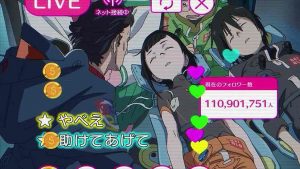 Maybe that’s why there’s a sense of urgency in the way Iso trades in ideas with Chikyuugai as compared to Dennou Coil, and not just because of their respective lengths. Iso recognizes that we’re running out of time – that the world today’s children are inheriting is being poisoned by the poor choices of the adults running it. This is unmistakably a hopeful story and it ends in a way that reflects that. But I don’t think Iso is so much suggesting a path forward – or perhaps it’s better to say he is, but has no illusions that anyone will follow it. Rather, he’s offering a cradle – a chance to feel hopeful for a few hours, and be reminded that it’s still possible to feel that way even if the moment is fleeting.
Maybe that’s why there’s a sense of urgency in the way Iso trades in ideas with Chikyuugai as compared to Dennou Coil, and not just because of their respective lengths. Iso recognizes that we’re running out of time – that the world today’s children are inheriting is being poisoned by the poor choices of the adults running it. This is unmistakably a hopeful story and it ends in a way that reflects that. But I don’t think Iso is so much suggesting a path forward – or perhaps it’s better to say he is, but has no illusions that anyone will follow it. Rather, he’s offering a cradle – a chance to feel hopeful for a few hours, and be reminded that it’s still possible to feel that way even if the moment is fleeting.
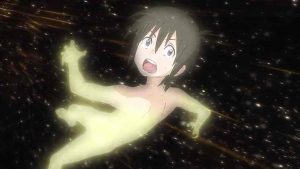 What separates The Orbital Children from Dennou Coil, among other things, is a sense that Iso has a very clear endpoint he’s trying to reach and writes with that in mind. With Dennou Coil it was as if he was musing on the future and possible elements of it that fascinated him, and the musing was the point of the story. That series was free-form jazz, or at least as close as anime can get to it. This one is more like a concerto, and the last movement is the one that has to tie everything together.
What separates The Orbital Children from Dennou Coil, among other things, is a sense that Iso has a very clear endpoint he’s trying to reach and writes with that in mind. With Dennou Coil it was as if he was musing on the future and possible elements of it that fascinated him, and the musing was the point of the story. That series was free-form jazz, or at least as close as anime can get to it. This one is more like a concerto, and the last movement is the one that has to tie everything together.
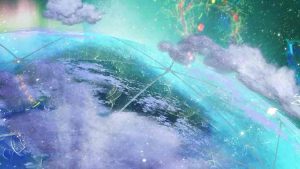 The AIs grew in importance as this series progressed – Seven, Twelve, Dakky, Bright – and they were central to the events of the finale. I think the critical moment of the finale came when Touya pleaded with Second Seven (speaking through Twelve) for the key to saving Konoha, and Second Seven replied “it’s not important”. This dichotomy – humans vs. humanity – was a theme Chikyuugai returned to over and over. Second Seven may have recalibrated its knowledge base to acknowledge the difference, but the idea was still fundamentally alien to it. For Touya, it was the opposite. The only thing that mattered to him in that moment was Konoha – humanity be damned.
The AIs grew in importance as this series progressed – Seven, Twelve, Dakky, Bright – and they were central to the events of the finale. I think the critical moment of the finale came when Touya pleaded with Second Seven (speaking through Twelve) for the key to saving Konoha, and Second Seven replied “it’s not important”. This dichotomy – humans vs. humanity – was a theme Chikyuugai returned to over and over. Second Seven may have recalibrated its knowledge base to acknowledge the difference, but the idea was still fundamentally alien to it. For Touya, it was the opposite. The only thing that mattered to him in that moment was Konoha – humanity be damned.
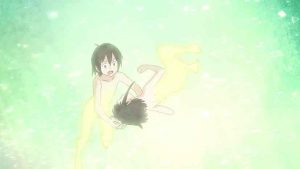 This finale waded into some pretty deep philosophical weeds – the nature of death, the 11th dimension (M-theory), substance not being real. Essentially, it comes down to this whole individuality vs. collective debate, and the idea of cradles. The Seven Poem may have predicted the future with unerring accuracy, but ultimately to believe that the future is predetermined is to reject the idea of individuality. I also think it’s worth noting that both Seven and Second Seven predicted their own death – and neither did anything to prevent it (in fact, Second Seven effectively committed suicide in the service of humanity).
This finale waded into some pretty deep philosophical weeds – the nature of death, the 11th dimension (M-theory), substance not being real. Essentially, it comes down to this whole individuality vs. collective debate, and the idea of cradles. The Seven Poem may have predicted the future with unerring accuracy, but ultimately to believe that the future is predetermined is to reject the idea of individuality. I also think it’s worth noting that both Seven and Second Seven predicted their own death – and neither did anything to prevent it (in fact, Second Seven effectively committed suicide in the service of humanity).
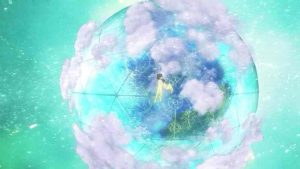 For Touya, he could only claim his future by rejecting that which defined his past. He outgrew the childish notion that 36.9% of humanity needed to be excised once he recognized the existence of humans as individuals. And he recognized that space was his cradle – and only by leaving it could he continue to grow as a person (and become a CEO at 14, of course). Be it a Nobel Prize, obscene riches, a technology company, or simply being alive, the extraterrestrial boys and girls all claimed a piece of the future for themselves. But humanity as a concept still exists, and the challenges facing it don’t simply go away (though there are hints at solutions, like an increased interest in colonizing space).
For Touya, he could only claim his future by rejecting that which defined his past. He outgrew the childish notion that 36.9% of humanity needed to be excised once he recognized the existence of humans as individuals. And he recognized that space was his cradle – and only by leaving it could he continue to grow as a person (and become a CEO at 14, of course). Be it a Nobel Prize, obscene riches, a technology company, or simply being alive, the extraterrestrial boys and girls all claimed a piece of the future for themselves. But humanity as a concept still exists, and the challenges facing it don’t simply go away (though there are hints at solutions, like an increased interest in colonizing space).
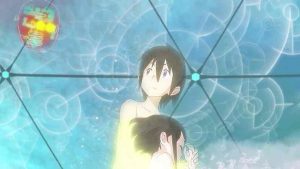 In most respects, Chikyuugai Shounen Shoujo is an extremely traditional piece of science-fiction – in the mold of Lem, Asimov, or Clarke. Though it seems out of fashion these days you used to hear the term “speculative fiction” a lot – often synonymously with sci-fi, though it’s a broader category – and I think a story like this really fits that description. Iso offers a glimpse of a possible future or futures, which grow out the problems of our present yet manage to find kernels of hope in them. Sci-fi has always been about possibility if it’s about anything, and nothing in this series is really all that outlandish. What will stop what we see from coming to pass is our own narrow-mindedness and clinging to the past, and being guided by fear rather than hope.
In most respects, Chikyuugai Shounen Shoujo is an extremely traditional piece of science-fiction – in the mold of Lem, Asimov, or Clarke. Though it seems out of fashion these days you used to hear the term “speculative fiction” a lot – often synonymously with sci-fi, though it’s a broader category – and I think a story like this really fits that description. Iso offers a glimpse of a possible future or futures, which grow out the problems of our present yet manage to find kernels of hope in them. Sci-fi has always been about possibility if it’s about anything, and nothing in this series is really all that outlandish. What will stop what we see from coming to pass is our own narrow-mindedness and clinging to the past, and being guided by fear rather than hope.
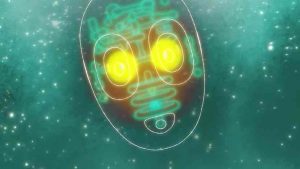 I don’t think Iso is telling us that’s not going to happen – I think he’s showing us that it’s nice to dream on the possibility. That’s a cradle, there’s no denying it, but in this sense maybe Taiyou is right – cradles have their uses, both for humans and for humanity. I’m not that surprised that Chikyuugai Shounen Shoujo isn’t being fully recognized for the incredibly smart and ambitious work that it is. It’s the sort of anime that (ironically) will only see its greatness recognized in the future. Eventually it’ll be recognized as the masterpiece it is, and I hope we don’t have to wait fifteen more years for Iso-sensei to produce his next one.
I don’t think Iso is telling us that’s not going to happen – I think he’s showing us that it’s nice to dream on the possibility. That’s a cradle, there’s no denying it, but in this sense maybe Taiyou is right – cradles have their uses, both for humans and for humanity. I’m not that surprised that Chikyuugai Shounen Shoujo isn’t being fully recognized for the incredibly smart and ambitious work that it is. It’s the sort of anime that (ironically) will only see its greatness recognized in the future. Eventually it’ll be recognized as the masterpiece it is, and I hope we don’t have to wait fifteen more years for Iso-sensei to produce his next one.


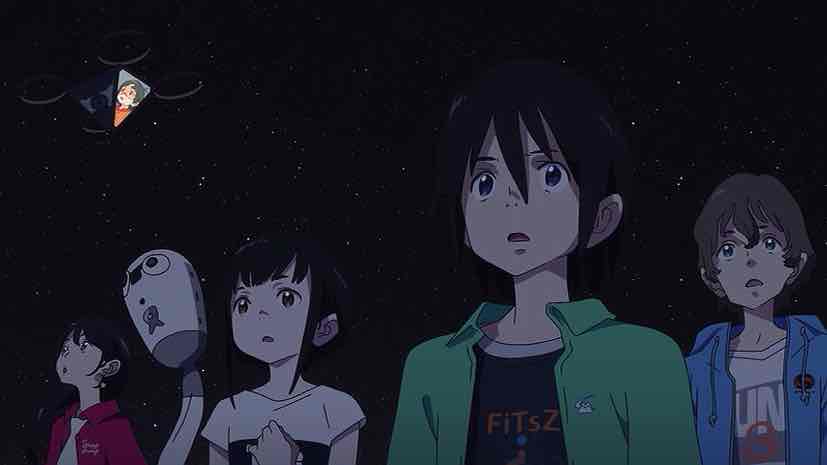
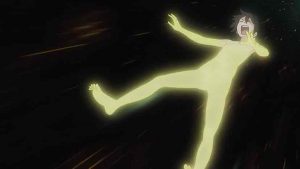
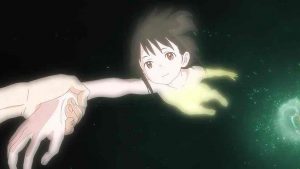
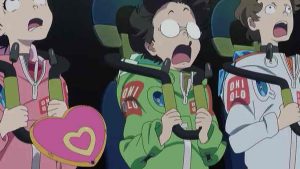
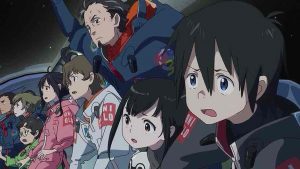
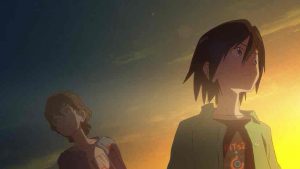
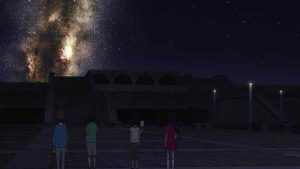
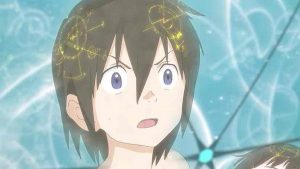
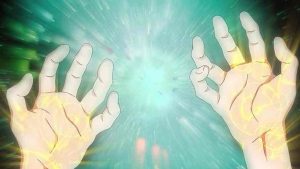
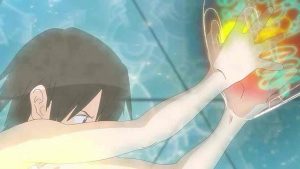
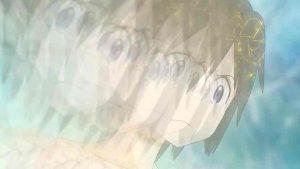
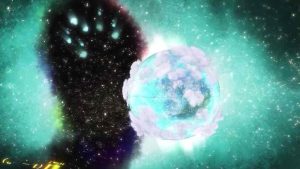
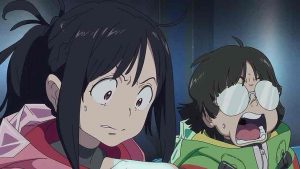
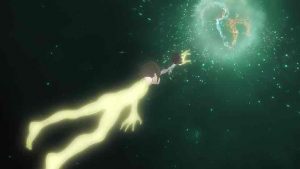
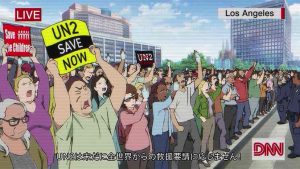
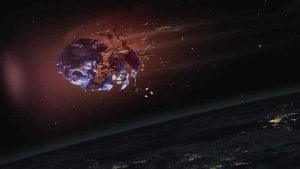
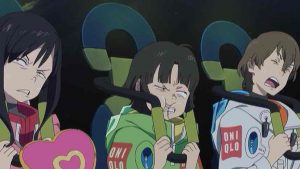
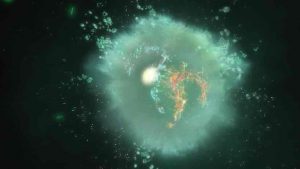
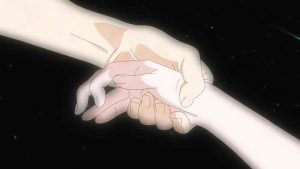
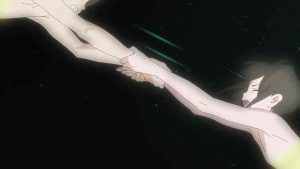
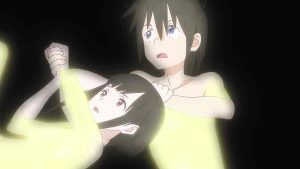
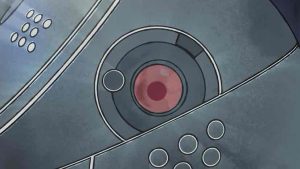
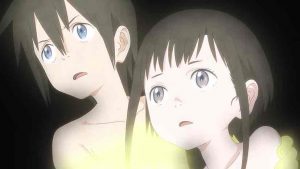
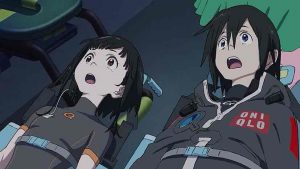
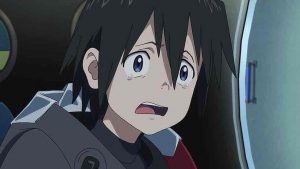
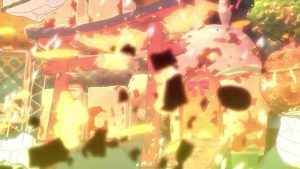
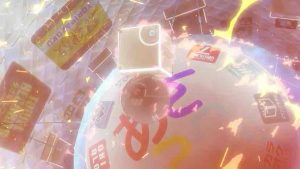
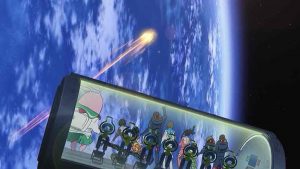
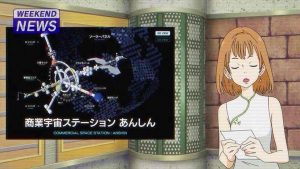

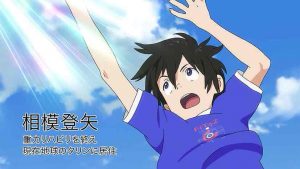
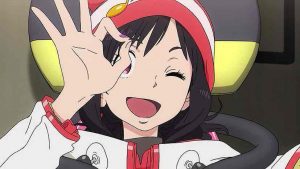
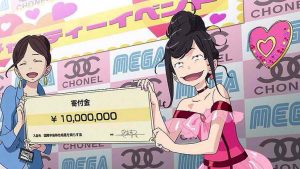
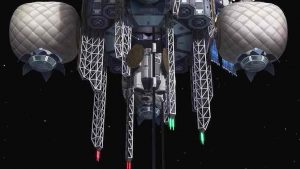
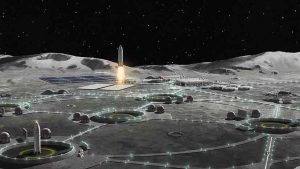
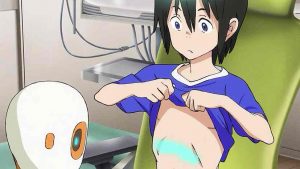
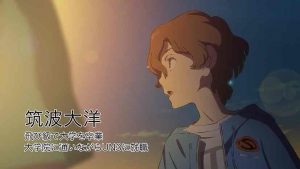
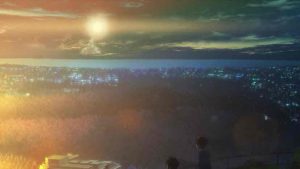
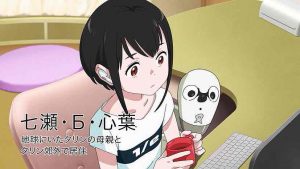
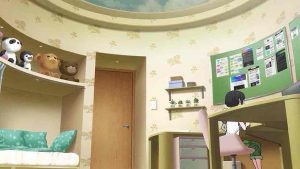
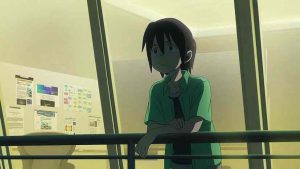
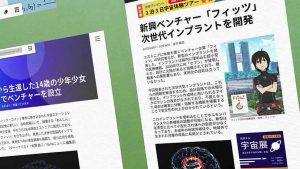
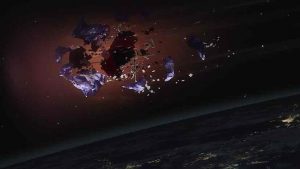
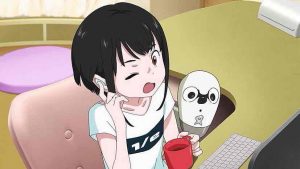
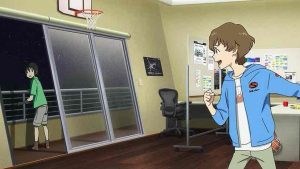
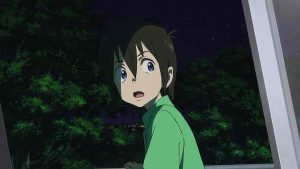
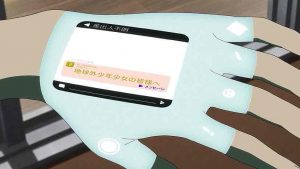
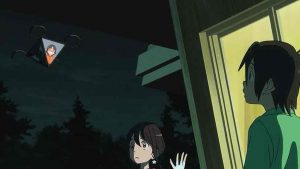
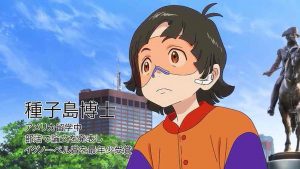
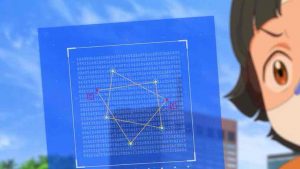
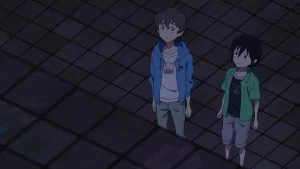

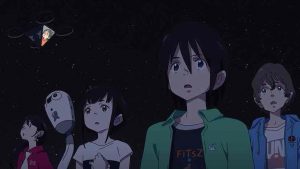
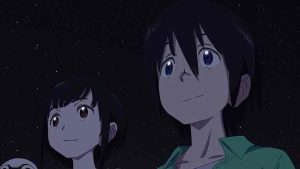
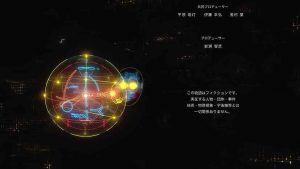


Raikou
February 13, 2022 at 8:09 pmAll in all, this is an anime with a very positive message from Iso Mitsuo.
Actually, when you make a post about Dennou Coil back then, I marathoned it and fell in love with it (although the last third of the series kind of a downgrade, with not maximizing the casts and the plot changed for the worse).
And with 6 episodes, Iso managed to tell a hopeful, compelling story this time, better than Dennou. I liked that ‘cradle’ seems to be a main theme, how we should be more hopeful for the future.
I’m really, really glad Iso came back for directorial job. Hoping he will be back with new anime. He’s still got it.
Too bad Orbital Children seems to go unnoticed by anime community.
A touching review, Enzo. Thank you.
Guardian Enzo
February 13, 2022 at 9:21 pmThanks for that kind comment. I don’t think it’s necessarily going unnoticed here, but my sense is that it isn’t getting much attention elsewhere. I wholeheartedly agree than Iso’s still got it, and while I recognize that working so rarely may be part of the reason why his writing is so fascinating (like Kubrick, who he’s clearly a fan of) I sure wish we got to see more of his work.
Raikou
February 14, 2022 at 10:29 amYou’re right , 14-15 years is too long. Hoping the next work will be in 2-3 years, and if Netflix can help with it, I have no problem.
Is it a theme Iso likes to use middle schooler as his protagonists? He seems to have high regards towards children.
Guardian Enzo
February 14, 2022 at 10:35 amAbsolutely seems to be his milieu.
Marty
February 14, 2022 at 1:56 pmNot gonna lie, despite the obvious artistic quality of this anime and the optimistic tone it sets, I think we are pretty much boned as a planet.
If I remember correctly, I read a scientific article that pretty much said that the effects currently felt are the end-result of delayed reaction from pollution a decade or so ago, so I’m sure as corporations keep pumping garbage into the environment, things will keep getting worse, far worse, before they can get better.
Hell, even the “Green” initiatives of plenty of countries are optics at best, and those are the countries that ACKNOWLEDGE climate change, unlike Conservatives in America.
All I’m saying is that the longer meaningful solutions are delayed, the more desperate and drastic the steps necessary will be, and the less likely businesses will be to follow through with those steps.
Rant aside, really well-made show. This is my first exposure to Iso, but it certainly won’t be the last.
Guardian Enzo
February 14, 2022 at 3:02 pmI agree basically but like I said, I don’t think Iso was preaching the message that everything is going to be fine. I think it’s more “here’s an escape for three hours. Remember when you could sometimes feel sorta hopeful?”
sonicsenryaku
February 17, 2022 at 3:11 pmSweet, you finally finished it; now we can talk about it proper. I quite like this series a lot; I’m not smitten enough with it to think it’s a masterpiece (and we’ll get into why) but we sure as hell don’t get anime like this anymore, at least as frequently as we used to and that’s a damn shame because booooy do I miss this kind of sci-fi shit. Mitsuo Iso just knows how to create an enthralling world of science fiction that feels as if it is very much within our technology grasp given enough time. It’s all in the way he textures the details of his setting that invoke such a probable outlook into humanity’s existence and the achievements we’ll unlock in due time. One of the ideas I found interesting that were espoused by Nasa Houston (how come no one questioned whether that was her real name or not lol) was the “defective” nature of mankind’s intelligence and how our solution is to rely on omniscient entities to fix that. Human intelligence is not capable of thinking in the dimensions necessary to answer complex questions like “what is life? What is the universe? What existed before the universe?” so our innate defect created Gods as a solution: prophetic, infallible beings with the right to cast judgment upon humanity.
When mankind tried to exert independence beyond the concepts of gods through the advent of science and technology, our “defect” led to great accomplishments, but also harmful and destructive ones too, so humanity reverted back to relying on an omniscient entity: AI and its groundbreaking use of quantum computing, which if you know anything about it, attempts to predict undefined states of information (or superposition) using complex mathematical algorithms. In theory this all works because even if you don’t know the state of an object, its interaction with other objects of known state can allow you to predict the nature of the undefined object (in quantum computing known as a qubit). This is how quantum computers will essentially be able to make far-out predictions about the future of things in our real world the way seven and second seven can. Unfortunately in the real world, it takes way too much power to prevent a single qubit from falling out of decoherence (when a data object loses its undefined state prematurely), let alone process it, and so we are still pretty far away from using quantum computing practically even though companies like Palantir technologies want to change that.
Anyway, I just find it interesting that Nasa found humans’ reliance on AI as the return of creating gods to guide humanity once more (would explain the cult following Seven had), especially with AI’s ability to predict the future and solve problems that humans wouldn’t be able to; AI, just like Gods, are prophetic and seemingly infallible. Humans created Gods out of faith, but now with the advancement of technology, humans can create Gods out of technology. It’s as if Nasa implies that human beings require a higher power to guide them because we can’t guide ourselves. In that sense, Gods are human beings’ intelligence cradle and probably always will be until we figure out how to think in dimensions beyond 3. It’s also ironic that humans created the idea of gods, who are believed to have created us; then once again, through the use of technology, created systems that would be deemed as gods too. Mankind always creates their gods it seems; will that always be the inevitableness of “defected intelligence?” Was the creation of Seven a coincidence or providence?
The original Seven responsible for Touya and Konoha’s implants was a rapid learning AI that sought to learn more and surpass the limits of its intelligence; however, it seemed like the laws of the world enforcing AI intelligence limiting made it so that it couldn’t do so, and so before being shut down, Seven devised a way to someday evolve past the cradle humanity put upon it. It predicted its own death and rebirth (on some Jesus Christ shit), then ensured that it had a way to communicate and unlock any limits to its intelligence through Konoha, then after ascending to godhood, decided to give humanity a chance at a future; now whether that was its intention the whole time or if that ended up being the case because Touya’s unwillingness to give up on Konoha made Seven finally understand the value of the individual is kind of up in the air, but it’s interesting to think about nevertheless.
I dig what this show is and what it ultimately represents as a narrative. I’m impressed with its ability to pile together a whole bunch of conceptual threads in the span of 180 mins and make all of them tangible to the themes it was trying to explore. I agree with you that in some ways, the shorter length (or film-like/ova format) had its benefits in that it kept the story focused and always moving at enough of a clip to not sag too much into listless, untapped potential the way the second half of dennou coil arguably turned out. Most of the ideas Orbital Children brings up are expressed and implemented in a meaningful way, making for a series that leaves no stone unturned in its musings. Not to mention its charmingly positive conclusion is a nice ribbon on the bow of a fun and compelling sci-fi series. In a genre that’s usually ambivalent about the future of humanity, it was nice to see hopefulness from an auteur of this field of fiction.
Where I think this series falls just a bit short comes down to two things: how it uses exposition to lead audiences to discover information and its character drama. The show is dense for its 6 ep run; it’s packed with a lot of information that’s necessary for the viewer to digest in order to follow its basic plot threads, and because of this density, it sometimes has to just flat out tell you things. Orbital children is able to make this work most of the time, but there a few instances where the exposition doesn’t feel as elegant. One of the reasons I think fans of dennou coil love the first half so much is because of its sense of scientific discovery. The show wasn’t just telling you things, it was building a world while allowing you as the viewer to discover it along with our ragtag group of kids. Discovery is the ethos of good sci-fi (and exposition in general). With a higher episode count, information could have been dispersed to the viewer more naturally throughout. Yes, there are times when a story just has to explain stuff to you; but even then there are proficient ways to go about disguising that. I think Orbital children does a good enough job disguising its blatant exposition, but then there just a few times that it doesn’t and it’s noticeable.
Now let’s talk about the other areas Orbital children falls a bit short in; the character drama. Let’s be real, most of the cast here are 2 dimensional at best. However, as I’ve said time and time again, 2-dimensional doesn’t have to be such a pejorative term depending on how you texture and utilize your 2-dimensional characters; I know people like to use 2-dimensional as a buzz word to slander characters but, it’s actually not so bad here (to be frank, 2-dimensional tends to serve as slander by people only when they find characters to annoy them in some way). Iso uses his understanding of children and their psychology to paint immersive behavioral dynamics that in turn, engage you into the characters without actually needing to paint their personalities in broad strokes. The other character writing technique Iso uses effectively is the ole, “Character development through action”, where you place characters in exciting situations and let their decisions inform something about who they are, endearing them to you. Orbital children uses this expertly enough to generate lasting investment in the characters in tandem with a brisk unraveling of essential plot details. It’s a meticulous blend; an ebb and flow of storytelling elements that work quite well, especially in the hands of someone who understands how to best regulate the pace so you don’t feel the negative consequences of leaving your characters in a 2-dimensional state.
Unfortunately where I felt the effects of the characters being two-dimensional and having thin interpersonal dynamics left was mostly in the climax, specifically where Touya puts his big boy pants on and says “fuck you” to fate when saving Konoha. The moment would have resonated more strongly if there was more time spent expanding on the emotional depth of their bond; illustrate how much they truly meant to each other beyond the story just telling us how much Touya cares about her. Powerful storytelling is all about fleshing out the details and connecting them to hallmark moments in the narrative; but here, the details aren’t fleshed out with poignant moments so the connection to Touya and Konoha’s hallmark moment doesn’t feel as momentous (and Konoha is a pretty thin character herself although her grappling with death had some interesting implications). Touya’s refusal to follow fate has thematic coherence but lacks the full emotional punch to complete the circuit. And that’s my spiel; I could write on and on about my thoughts on this good ass show but no one wants to hear me run my mouth off forever. 7.75/10; will be rewatching soon.
Guardian Enzo
February 17, 2022 at 8:16 pmI’m amazed that didn’t get moderated just for length, ROFL.
Lot to unpack there, that’s for sure. Just as a quick reaction I’d say there was a lot that was discernible about the Touya-Konoha relationship without it having to be spelled out in words. Maybe if this has been a full cour or longer you’d have gotten what you were looking for in terms of physical interaction between the two of them to develop the relationship. But it wasn’t, and Iso had to make choices based on the running time he had to work with.
Sonicsenryaku
February 18, 2022 at 12:04 amDuuuuuude, you can’t imagine how shocked I was when I hit the post button and everything went through, lmao. I was like: here I go rambling again, watch this not even post.”
Anyway, yea I peeped some of the more subtle details of Touya and Konoha’s relationship, but my exact gripe is that even the more subtle stuff wasn’t as rich or as interesting as it could have been. While the subtle details of their relationships justify the direction of the climax (I even predicted this outcome, mostly cuz it made the most sense to me that this is how the story needed to end), for me it didn’t pack enough gravity . I was invested somewhat, but not as much as I’d imagine I would have been with such a climax if the character work was stronger, even with subtlety. Iso can do subtle yet compelling and I know he can; this wasn’t it. It was by no means uninteresting; it was just an aspect of the story that could have used more care. In the end, I understand that this wasn’t a product of poor writing capabilities; the man knows how to write characters. There just wasn’t enough time and so he did what he could. At the very least he was able to provide most the main cast character arcs, and given how dense this show is, that’s pretty great